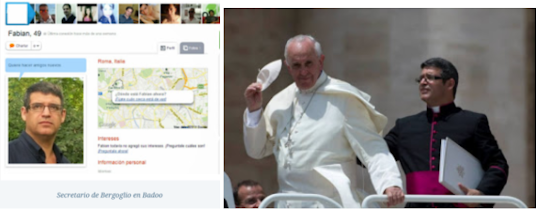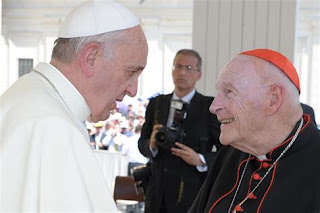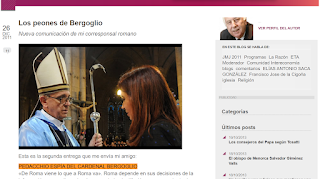Nephew of late Argentine cardinal accuses Pope Francis of covering up homosexual abuse
BUENOS AIRES, Argentina (LifeSiteNews) – The nephew of Pope Francis’ predecessor as archbishop of Buenos Aires accused the pope of covering up homosexual clerical abuse in a recent interview and blasted Francis for the leadership style “of a despot.”
Speaking with Gloria.tv, Dr. José Arturo Quarracino, a teacher and nephew of the late Cardinal Antonio Quarracino, said that Francis protected homosexual priests for years after succeeding his uncle, who led the archdiocese of Buenos Aires from 1990 to his death in 1998.
Dr. Quarracino said that he ran in the same circles as the future pope, Fr. Jorge Mario Bergoglio, while the Argentine Jesuit served as provincial superior of the Society of Jesus in the 1970s.
“From 1995 to 2002, I worked in Bergoglio’s environment,” Quarracino added. “He was chancellor of the Universidad del Salvador, where I worked.”
At the time, Bergoglio, who was appointed archbishop in 1998, “maintained a very Jesuit profile, very pious, very pastoral,” according to Quarracino.
But he affirmed to Gloria.tv that Archbishop Bergoglio repeatedly covered up sexual abuse and misconduct “because this often concerned people who were close to him.”
“The case of a priest whom he trusted very much and who was known for his homosexual tendencies was much talked about,” Quarracino said. “Bergoglio ‘helped’ him by sending him to Rome a few years before he became Pope, among other things because this allowed him to learn a lot of confidential information from the Holy See.”
 |
| The homosexual Pedacchio spy and Bergoglio's accomplice |
“One must not forget that these kinds of personalities tend to gather information of all kinds, information in which Bergoglio was interested.”
Quarracino also recalled that a civil servant “very close” to Bergoglio continued working at the University del Salvador even after the archbishop was informed that the man distributed pornography to university members.
“In April 2001, a few months after his elevation to Cardinal, an employee of the Universidad del Salvador, of which he was Grand Chancellor, informed him that a person very close to Bergoglio, who not only worked in this house of studies but was also a civil servant, had distributed pornographic photos to members of the university for fun,” Quarracino related. “This person was able to continue working for several years without any problems, while the person who had brought this to Bergoglio’s attention was dismissed without cause a few months later.”
The homosexualism displayed by Bergoglio during his papacy wasn’t publicly visible in Argentina, however, Quarracino said. “That would have made it impossible for him to be elected Pope.”
Cdl. Bergoglio Protected Homosexual Bishop in Argentina
Bergoglio protects homosexual predators and their concealers
BERGOGLIO´S HERETICAL PAST IS FRANCIS PRESENT.
Pope Pius IV (1499-1565)
"We declare that if ever it should appear that any bishop, even one acting as an Archbishop, Patriarch, or Primate, or a Cardinal of the Roman Church, or a legate, or even the Roman Pontiff, whether prior to his promotion to Cardinal, or prior to his election as Roman Pontiff, has beforehand deviated from the Catholic Faith or fallen into any heresy, we enact, we decree, we determine, we define: Such promotion or election in and of itself, even with the agreement and unanimous consent of all the Cardinals, shall be null, legally invalid, and void. It shall not be possible for such a promotion or election to be deemed valid or to be valid, neither through reception of office, consecration, subsequent administration, or possession, not even through the putative enthronement of a Roman Pontiff himself, together with the veneration and obedience accorded him by all. Such promotion or election shall not through any lapse of time in the foregoing situation be considered even partially legitimate in any way. Each and all of the words, as acts, laws, appointments of those so promoted or elected -- and indeed, whatsoever flows there from -- shall be lacking in force, and shall grant no stability and legal power to anyone whatsoever. Those so promoted or elected, by that very fact and without the need to make any further declaration, shall be deprived of any dignity, position, honor, title, authority, office, and power. Therefore, it is permitted to no one to impair this page of Our approval, renewal, sanction, statute, wills of repeal, of decrees, or to go contrary to it by a rash daring deed. If anyone, moreover, will have presumed to attempt this, he will incur the wrath of Almighty God and of the blessed Apostles Peter and Paul." -Pope Paul IV (1555-1559), Bull "Cum ex Apostolatus Officio," February 16, 1559, sec. 9







No comments:
Post a Comment
Note: Only a member of this blog may post a comment.